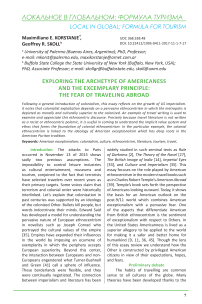Exploring the archetype of americaness and the excemplary principle: the fear of traveling abroad
Автор: Korstanje Maximiliano E., Skoll Geoffrey R.
Журнал: Современные проблемы сервиса и туризма @spst
Рубрика: Локальное в глобальном: формула туризма
Статья в выпуске: 1 т.11, 2017 года.
Бесплатный доступ
Following a general introduction of colonialism, this essay reflects on the growth of US imperialism. It notes that colonialist exploitation depends on a pervasive ethnocentrism in which the metropolis is depicted as morally and culturally superior to the colonized. An example of travel writing is used to examine and appreciate this ethnocentric discourse. Precisely because travel literature is not written as a racist or ethnocentric polemic, it is useful in coming to understand the implicit value system and ethos that forms the foundation of colonial ethnocentrism. In the particular example, the colonial ethnocentrism is linked to the ideology of American exceptionalism which has deep roots in the American Puritantradition.
American exceptionalism, colonialism, culture, ethnocentrism, literature, tourism, travel
Короткий адрес: https://sciup.org/140206598
IDR: 140206598 | DOI: 10.22412/1995-0411-2017-11-1-7-17
Список литературы Exploring the archetype of americaness and the excemplary principle: the fear of traveling abroad
- Bandyopadhyay,R.,&Morais,D.(2005).RepresentativeDissonance:India’sSelfandWesternImage. Annals of Tourism Research, 32(4), 1006-1021.
- Brantlinger, P. (1990). Rule of Darkness: British Literature and Imperialism, 1830-1914. Ithaca. New York: Cornell Univ. Press.
- Buck-Morss,S.(1986).TheFlaneur,theSandwichmanandtheWhore:ThePoliticsofLoitering.InNew German Critique (Autumn). Milwaukee, WI: University of Wisconsin-Milwaukee.99-140.
- Burns,P.M.(2004).SixpostcardsfromArabia:AvisualdiscourseofcolonialtravelsintheOrient.Tourist Studies, 4(3), 255-275. DOI: 10.1177/1468797604057327
- Busby, G., Korstanje, M. E., &Mansfield, C. (2011). Madrid: Literary Fiction and the Imaginary Urban Destination. Journal of Tourism Consumption and Practice,3(2).
- Caton, K., &Santos, C. A. (2008). Closing the hermeneutic circle? Photographic encounters with the other. Annals of Tourism Research, 35(1), 7-26. DOI: 10.1016/j.annals.2007.03.014
- Chateaubriand, F. (1944). Viaje a América. Buenos Aires: EmecéEditores.
- Cheyfitz,E.(1993).SavageLaw,theplotagainstAmericanIndiansinJohnson&Graham´sLeseevMÍn-tosh and the Pioneers. In Cultures of United States Imperialism. Ed. by A. Kaplan &D. Pease. Durham: Duke Univ. Press,109-128.
- Coleman, S. (2001). Actors of History? Religion, Politics, and Reality within the Protestant Right in America.InReligion,politicsandglobalization:anthropologicalapproaches.Ed.byG.Lindquist& D. Handelman. New York: Berghan Book, 171-188.
- Edwards,J.(1741).SinnersintheHandofanAngryGod.Ed.byR.Smolinski.Electronic TextsinAmeri-can Studies. Paper 54. Lincoln, NB: University of Nebraska-Lincoln. http://digitalcommons.unl.edu/etas/54.
- FitzGerald, F. (1986). Cities on a Hill: A Journey Through Contemporary American Cultures. New York: Simon and Schuster.
- Glassner, B. (1999). The Culture of Fear: Why Americans Are Afraid of the Wrong Things. New York: BasicBooks.
- Grandena,F.(2013).TheConstantTourist:passingincimacyandtouristicNomadisminDroledeFelix. In Open Roads, Closed Borders: the temporary French-language Road Movie. Chicago: University of Chicago Press,19-38.
- Greenberger, A.J. (1969). The British image of India: a study in the literature of imperialism, 1880-1960. Oxford: Oxford Univ.Press.
- Guidotti-Hernández,N.M.(2011).Unspeakableviolence:RemappingUSandMexicannationalimagi-naries. Durham, NC: Duke Univ.Press.
- Heilbroner,R.L.(1995).TheWorldlyPhilosophers.Thelives,timesandideasofthegreateconomic thinkers. New York: Touchstone.
- Hofstadter,R.(1992).SocialDarwinisminAmericanthought.Boston,MA:BeaconPress.
- Ignatieff,M.(2001).HumanRights.AsPoliticsandIdolatry.NewJersey:PrincetonUniv.Press,3-53.
- Ignatiev, N. (1995). How the Irish Became White. New York:Routledge.
- Irwin,R.(2007).TheCultureShock,negotiatingfeelinginthefield.AnthropologyMatters,9(1),1-11.
- Janiewski, D. (1991). Southern honor, Southern deshonor: managerial ideology and the construction of gender, race and class relations in southern industry. In Work Engendered. Toward a new history of American Labor. Ed.A. Baron. Ithaca: Cornell Univ. Press,47-69.
- Kerouac, J. (1957). On the Road. New York: VikingPress.
- Korstanje,M.(2006).IdentidadyCultura:unaporteparacomprenderlaConquistadeAmérica.Iberia, Revista de la Antigüedad, 9(1), 191-212.
- Korstanje,M.(2012).Reconsideringculturaltourism:ananthropologist’sperspective.JournalofHeri-tage Tourism, 7(2),179-184.
- Korstanje,M.(2013).EmpireandDemocracy,acriticalreadingofMichaelIgnatieff.Nómadas:revista crítica de Ciencias Sociales y Jurídicas, 38(II),69-78.
- Korstanje,M.E.,&Olsen,D.H.(2011).Thediscourseofriskinhorrormoviespost9/11:hospitalityand hostility in perspective. International Journal of Tourism Anthropology, 1(3),304-317.
- Lukács,G.(1971).TheTheoryoftheNovel:Ahistoric-philosophicalessayontheformsofgreatepic literature. Massachuseets: MIT press.
- Mansfield, C. (2008). Traversing Paris: French Travel Writing practices in the Late TwentiethCentury. Saarsbruck: VDM Verlag.
- Mazierska, E. (2013). Tourism and Travelling in Jean-Luc Godard´s Allemagne 90 neuf zero and Eloge de l´amour. In Open Roads, Closed Borders. Ed. by M. Gott &T. Schilt. Chicago: University of Chicago Press,119-136.
- Miller,P. (1953).TheNewEnglandMindfromColonytoProvince.Cambridge,MA:HarvardUniv.Press.
- Oberg,K.(2007).CultureShock:AdjustmenttoNewCulturalEnvironments.PracticalAnthropology,7, 177-182.
- Palmer, C.A. (1994). Tourism and colonialism: The experience of the Bahamas. Annals of Tourism Research, 21(4),792-811.
- Pratt, M.L. (2011). Ojos Imperiales, literatura de viajes y transculturación. Buenos Aires:FCE.
- Rascarolli, L. (2013). On Eve of the journey, Tangier, Tbillisi, Calais. In Open Roads, Closed Borders. Ed. by M. Gott, T. Schilt. Chicago: Chicago Univ. Press,19-38.
- Said, E.W. (1993). Culture and imperialism. New York: Random HouseLLC.
- Skoll, G. (2009). Contemporary Criminology and Criminal Justice Theory. Evaluating justice Systems in Capitalist Societies. New York: PalgraveMacmillan.
- Skoll,G.R.(2010).Socialtheoryoffear:terror,torture,anddeathinapost-capitalistworld.NewYork: PalgraveMacmillan.
- Skoll,G.,&Korstanje,M.(2013).ConstructinganAmericanFearCulturefromRedScarestoTerrorism. International Journal of Human Rights and Constitutional Law, 1(4), 341-364.
- Temple, C. R. (1961). Americans Abroad. New York: SterlingPubl.
- Teng, E. (2004). Taiwan’s imagined geography: Chinese colonial travel writing and pictures, 1683-1895. Vol. 230. Harvard Univ. AsiaCenter.
- Turner-Bushnell, A., &Greene, J. (2002). Peripheries, Centres and the construction of early modern AmericanEmpires.InNegotiatedEmpires.Ed.byC.Daniels&M.KennedyNewYork:Routledge,1-14.
- Weber, M. (1958). Essays in Sociology. New York: Oxford Univ.Press.
- Weber, M. (1964). Economía y sociedad: esbozo de sociología comprensiva. México, D.F.: Fondo de CulturaEconómica.
- Weber, M. (1995). La Ética Protestante y el Espíritu del Capitalismo. Barcelona:Península.
- Wildman, S.M. (1996). Privilege revealed: How invisible preference undermines America. New York: NYUPress.


